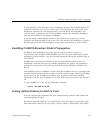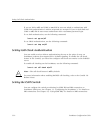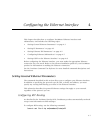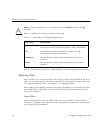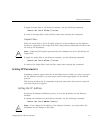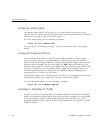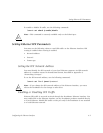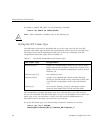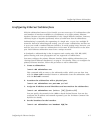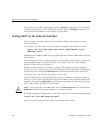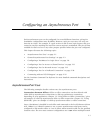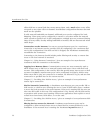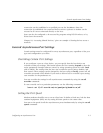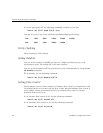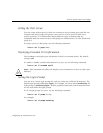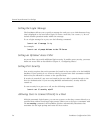
Configuring the Ethernet Interface 4-7
Configuring Ethernet Subinterfaces
Configuring Ethernet Subinterfaces
With the subinterface feature of the ComOS, you can create up to 512 subinterfaces (the
total number of interfaces available on a PortMaster) on a single primary Ethernet
interface. Because you have the bandwidth of only a single Ethernet interface, however,
efficiency begins to degrade significantly when you add more than 8 subinterfaces.
Subinterfacing is essentially the segmenting of a single wire, or port, into multiple IP
networks. Instead of subnetting and routing, you can create a subinterface and then set
it up as you would a standard Ethernet interface. To avoid routing loops, however, you
must be sure not to create two subinterfaces in the same TCP/IP network on the same
port. Each Ethernet subinterface must have a unique network.
A drawback to subinterfacing is that it supports static routing only; IPX, RIP, OSPF,
packet filtering, and route propagation are not supported on subinterfaces.
You must configure the primary Ethernet interface before adding subinterfaces (see
“Setting General Ethernet Parameters” on page 4-1 for details). After you configure the
primary Ethernet interface, follow this procedure to add a subinterface.
1. Create a subinterface.
Command> add subinterface name
This command adds an entry to the subinterface table, which you can then view
with the show subi command. Remove a subinterface from the subinterface table
with the del subi command.
2. Associate the subinterface with a physical port.
Command> set subinterface name port-name portlabel
3. Assign an IP address or and IP address and net mask to the subinterface.
Command> set subinterface name Ipaddress [/NM]|[Ipaddress/NM]
You can specify the netmask in the
/NM
or dotted decimal format. You can also
configure the IP address and netmask separately (see the
PortMaster Command Line
Reference
for details
).
4. Set the broadcast for the interface.
Command> set subinterface name broadcast high|low



